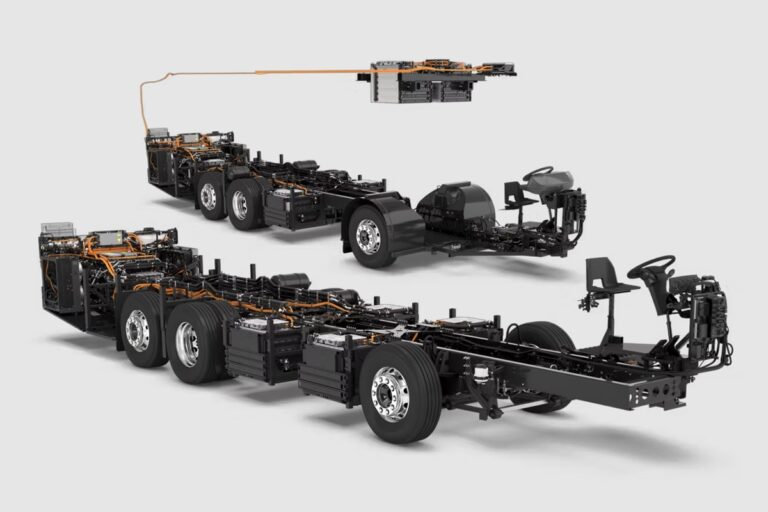The Swedish company is marketing the new Volvo 8900 Electric as an all-electric low-entry bus for urban, intercity and commuter transport. It is available in two lengths (12.3 or 14.9 metres) and can be equipped with four to six battery packs with 90 kWh each, giving a maximum total energy content of 540 kWh. The electric drive is available either as a single-motor version with 200 kW or a dual-motor version with 400 kW.
The 8900 Electric intercity bus is the first model on the BZR Electric platform. It complements Volvo’s 7900 Electric city bus, which is based on Volvo’s mixed platform for low-floor vehicles. The latter is available as a diesel, CNG, hybrid or purely electric solo and articulated bus. As a BEV, it has a battery capacity of up to 470 or 565 kWh (18.7 m variant).
As mentioned, the 8900 Electric, announced for 2025, will be available in two body lengths. The two-axle version, with an overall length of 12.3 metres, offers space for 88 passengers, 43 of whom are seated. A 14.9 metre-long three-axle version can carry 110 passengers, 57 of whom are seated. The gross vehicle weight rating for the smaller 8900 is 20.6 tonnes, and 27 tonnes for the longer version. The width and height of both variants are identical at 2.55 and 3.6 metres. The wheelbase differs by 90 centimetres (three-axle: 7m; two-axle: 6.1m).
According to Volvo, the battery packs weigh 535 kilograms each. The shorter 8900 can hold four or five packs, meaning 360 or 450 kWh. The longer intercity bus is designed for four to six packs, which allows a maximum capacity of 540 kWh in addition to 360 and 450. Volvo does not provide any information on the range. However, it does specify that it uses batteries with NCA chemistry. In addition, the charging port can be ordered on the left or right.
BZR Electric to offer “outstanding versatility”
With the 8900 Electric, Volvo Buses also presented the new platform on which the electric bus is based, the BZR Electric. The manufacturer states that it is the result of a “Volvo Group common architecture.” Volvo had already presented an electric chassis in 2021, which was called BZL Electric (L instead of R, notably) and was designed for solo and double-decker buses. The two have little in common besides the similar name and the drive power (200 and 400 kW).
The BZR Electric supports vehicles with a length of 9.5 to 14.9 metres and a maximum nominal battery capacity of 540 kWh. This shows that Volvo’s new intercity bus fully utilises the 600-volt platform. The centrepiece is an electric motor coupled with a two-stage automated transmission with 200 kW or 400 kW in the dual-motor variant. According to the manufacturer, buses based on the BZR Electric can be charged both via cable with up to 250 kW DC and optionally via OppCharge with a maximum of 450 kW, thanks to two different hardware interfaces. The Volvo 8900 Electric presented above also offers this choice.
According to Volvo, the BZR Electric supports vehicles up to a gross vehicle weight of 27.2 tonnes and is “a productivity platform for city, intercity and commuter operations. Low-entry or medium floor, single or dual motors, modular energy storage, and two- or three-axle versions.” In this context, the company refer to the “outstanding versatility” of the new product.
Meanwhile, the body of the Volvo 8900 Electric is produced by Manufacturing Commercial Vehicles (MCV). Volvo Buses decided last year to no longer manufacture complete buses itself in Europe in the future. An agreement signed last spring stipulates that MCV will manufacture the bodies under licence from mid-2024. At the time, Volvo Buses and MCV also announced that they wanted to develop an electric range for intercity buses together. The result of this cooperation has now been unveiled in the form of the 8900.
Volvo Buses will continue manufacturing the chassis, including the electric drives, in the two Swedish plants in Borås and Uddevalla. However, the Volvo plant in Wroclaw, Poland, where the bodies for the chassis are currently produced, will close in Q1/2024. On the other hand, the bodies with bodywork and interior will be produced by MCV in future.
MCV, or Manufacturing Commercial Vehicles, is a company from Egypt that, as reported, also wants to gain a foothold in Germany with its own electric city bus. MCV has plants in Egypt, Singapore, and South Africa. It was once founded as Daimler’s general agency. Since 2006, MCV has been producing vehicles under its own brand name, which are mostly based on chassis from other manufacturers – such as Mercedes-Benz, but also Volvo Buses.
However, the cooperation is not exclusive: in parallel to the partnership with MCV, Volvo Buses says it is looking into partnerships with other manufacturers.
sustainable-bus.com (8900 Electric), sustainable-bus.com (BZR Electric), volvobuses.com (8900 Electric), volvobuses.com (BZR Electric)


